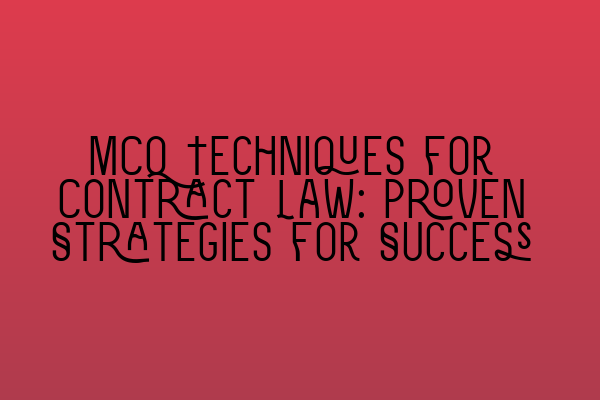MCQ Techniques for Contract Law: Proven Strategies for Success
Welcome to SQE Contract Law, the premier resource for all your contract law needs. In this blog post, we will be discussing MCQ (Multiple Choice Question) techniques for contract law exams. Whether you are a law student looking to ace your exams or a legal professional looking to refresh your knowledge, these proven strategies will help you boost your confidence and achieve success.
Before we delve into the techniques, it is important to understand the significant role MCQs play in contract law exams. MCQs test your knowledge, understanding, and application of key contract law principles. They require you to think analytically, identify the correct answer among the choices, and justify your selection. So, let’s dive into the strategies that will set you up for success.
1. Read the question carefully: MCQs are notorious for their tricky language and misleading options. To avoid falling into their traps, take your time and read the question carefully. Pay attention to keywords and phrases such as “except,” “not,” and “best.” These small words can completely change the meaning of the question and options.
2. Identify the topic and relevant principles: Contract law covers a wide range of topics, from offer and acceptance to breach and remedies. Before attempting an MCQ, identify the topic being tested and recall the relevant legal principles associated with it. This will help you eliminate irrelevant options and focus on the correct answer.
3. Eliminate incorrect options: One of the advantages of MCQs is the presence of multiple options. Use this to your advantage by eliminating obviously incorrect choices. Identify any option that directly contradicts a legal principle or that goes against your understanding of the topic. This narrowing down process will increase your chances of selecting the correct answer.
4. Apply legal reasoning and analysis: Contract law is all about application. While studying, make sure you understand the reasoning behind each legal principle. This will enable you to apply them effectively in MCQ scenarios. Remember to look for patterns and similarities between the question and the principles you have learned.
5. Use the process of elimination: If you find yourself unsure between two or more options, utilize the process of elimination. Cross out options that you are confident are incorrect, and focus on the remaining choices. By narrowing down your options, you increase your chances of choosing the correct answer.
6. Practice with past papers and mock exams: Practice makes perfect. Familiarize yourself with the structure and format of contract law MCQs by practicing with past papers and mock exams. This will help you gain confidence, improve your speed, and identify your areas of weakness. Remember to review the correct answers and explanations after each practice session.
In conclusion, mastering MCQ techniques for contract law exams can significantly improve your chances of success. By reading the question carefully, identifying relevant principles, eliminating incorrect options, applying legal reasoning, using the process of elimination, and practicing extensively, you will be well-equipped to tackle any contract law MCQ.
For further assistance and in-depth resources, be sure to check out our related articles:
– Interpreting Contractual Clauses: Unlocking the Hidden Meanings
– Contract Law Tutorials: Simplifying Complex Concepts for Students
– Discharge of Contracts: Modes and Consequences Explained
– Exploring Third Party Rights in Contract Law: Implications and Boundaries
– Contractual Obligations: Navigating the Responsibilities of Parties
At SQE Contract Law, we are committed to simplifying complex legal concepts and providing you with the tools you need to succeed in your contract law journey. Stay tuned for more informative blog posts and resources to enhance your contract law knowledge.
